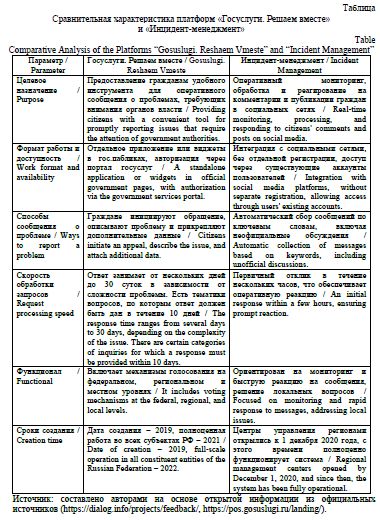Feedback platforms as a tool for regional socio-political mobilization
Relevance. Modern relations between local authorities and the population in the regions are changing under the influence of digitalisation and network communication, fostering the emergence of new forms of interaction and community mobilisation. However, existing interaction models do not always meet the requirements of a dynamic social environment, which necessitates the study of digital feedback platforms as tools for regional socio-political mobilisation. Scientific problem. The problem is that feedback platforms have significant potential as tools for socio-political mobilisation, but their capabilities, including feedback and public evaluation functions, are underutilised. Research results. The article explores the role of feedback platforms as tools for socio-political mobilisation in the context of digital transformation in regional governance. It examines the mechanisms of interaction between authorities and the population through digital platforms, including «Gosuslugi. Reshaem Vmeste» and «Incident Management». A comparative analysis of their functional capabilities and effectiveness in addressing local issues and responding to public demands is conducted. Special attention is given to case studies of urban environment renovation in Kemerovo and the protests of miners at the «Inskaya» mine. The findings highlight the insufficient use of platform functionalities in terms of leveraging diverse network interaction forms and incorporating public evaluation. The need for further development of platform functionalities is emphasized to fully harness their potential.
Figures

Kranzeeva, E. A., Brandt, Ya. A., Grigorik, N. N. (2025), “Feedback platforms as a tool for regional socio-political mobilization”, Research Result. Sociology and Management, 11 (1), 4212-226, DOI: 10.18413/2408-9338-2025-11-1-1-4.


















While nobody left any comments to this publication.
You can be first.
Brega, A. V. (2018), “Political risk in a networked society: a new configuration”, Sotsialno-gumanitarnye znaniya, (3), 221-229. (In Russian)
Gladchenko, I. A. (2019), “New approaches to the study of mobilization in online communities”, Terra Linguistica, (2), 30-43. (In Russian)
Grigorik, N. N. (2024), “The model of public assessment of local government”, Nauchny rezultat. Sotsiologiya i upravlenie, 10(2), 35-49. (In Russian)
Kranzeeva, E. A., Golovackij E. V., Orlova A. V. (2022), “Reactive interaction between the government and the population in social networks: Novokuznetsk transport reform”, Virtualnaya kommunikatsiya i sotsialnye seti, 1 (1), 24-30. (In Russian)
Kranzeeva, E. A., Golovatsky, E. V., Orlova, A. V. (2021), “Social and political interaction of local communities in the region in the context of reactive relations: cases of urban space improvement”, Vestnik Tomskogo gosudarstvennogo universiteta, (464), 81-90. (In Russian)
Nyatina, N. V., Grigorik, N. N., Molchanov, A. A. (2023), “Digitalization of socio-political interaction: mobilization of real and virtual communication”, Virtualnaya kommunikatsiya i sotsialnye seti, 2(3), 167-174. (In Russian)
Potseluev, S. P., Tsibenko S. N. (2019), “The phenomenon of national mobilization: to clarify the concept”, Ars Administrandi, 11(1),
1-23. (In Russian)
Putintseva, A. V. (2020), “The development of the phenomenon of “Cyberbullying”: an analysis of approaches to the definition”, Vestnik UYUI, (3), 51-57. (In Russian)
Kranzeeva, E. A., Golovatsky, E. V., Orlova, A. V., Nyatina, N. V., Burmakina, A. L. (2021), “Reactive social and political interactions in the innovation processes of Russian regions”, Vlast i upravlenie na Vostoke Rossii, (2(95)), 86-102. (In Russian)
Kranzeeva, E. A., Golovatsky, E. V., Burmakina, A. L., Donova, I. V. (2024), “Regional socio-political interaction online and offline: opportunities for comparison and measurement on the example of the environmental agenda”, Vestnik Tomskogo gosudarstvennogo universiteta, (500), 150-158. (In Russian)
Yanitsky, O. N. (2012), “Mass mobilization: problems of theory”, Sotsiologicheskie issledovaniya, (6), 3-12. (In Russian)
The study is supported by the Ministry of science and higher education of the Russian Federation, project number FZSR-2024-0017